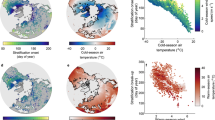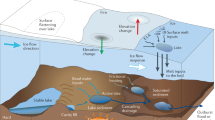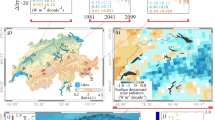Abstract
SOME preliminary work on the hydrological features of Lake Victoria was carried out in 1928 and 19311–3. The general conclusion was that due to frequent mixing of the surface and bottom waters, stratification in the Lake is only temporary and deoxygenation of the water never occurs. It has been found, however, that stratification and deoxygenation of the bottom water does occur in certain coastal areas, and is brought about by a process not previously described.
This is a preview of subscription content, access via your institution
Access options
Subscribe to this journal
Receive 51 print issues and online access
$199.00 per year
only $3.90 per issue
Buy this article
- Purchase on Springer Link
- Instant access to full article PDF
Prices may be subject to local taxes which are calculated during checkout
Similar content being viewed by others
References
Graham, M., Crown Agents for the Colonies, London (1929).
Worthington, E. B., Int. Rev. ges. Hydrobiol. Hydrogr., Bd. 24, 329 (1930).
Worthington, E. B., and Beadle, L. C., Nature, 129, 55 (1932).
Author information
Authors and Affiliations
Rights and permissions
About this article
Cite this article
FISH, G. Local Hydrological Conditions in Lake Victoria. Nature 169, 839–840 (1952). https://doi.org/10.1038/169839b0
Issue Date:
DOI: https://doi.org/10.1038/169839b0
Comments
By submitting a comment you agree to abide by our Terms and Community Guidelines. If you find something abusive or that does not comply with our terms or guidelines please flag it as inappropriate.



